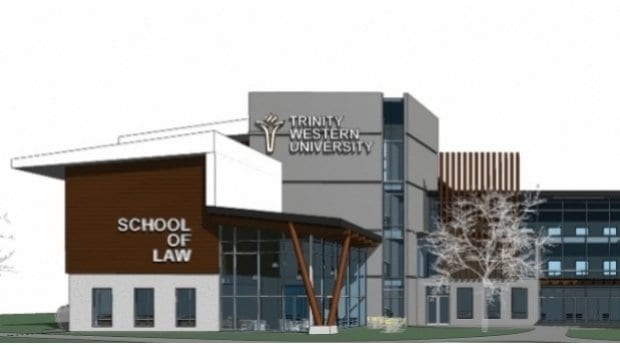The Law Society of New Brunswick voted to accredit Trinity Western University’s (TWU) proposed law school June 27.
Law society president John Malone acknowledged that the covenant requires students to act according to biblical values that prohibit sexual intimacy except within a marriage between a man and a woman. But, he said, the law society has a responsibility to represent all the communities that lawyers serve and to recognize both religious freedom and the right to sexual orientation without discrimination.
“No matter which law school they graduate from, all articled students complete law society training and evaluation,” he noted. “This includes the core aspects of professional responsibility, including non-discrimination. As well, the law society requires that lawyers not discriminate in their professional duties.”
For admission to TWU, students must sign a covenant agreeing to uphold Christian biblical teachings, including no premarital sex and no homosexuality. Failure to uphold these commitments, according to the student handbook, could result in discipline, dismissal or a refusal to readmit a student to the university.
The Law Society of BC initially agreed to accredit TWU graduates as well, saying it had no choice but to follow a 2001 Supreme Court of Canada decision upholding TWU’s right to teach Christian values to would-be teachers and to insist that incoming students sign its covenant. The court found that graduates of TWU’s teacher-education program are entitled to hold “sexist, racist or homophobic beliefs” as long as they don’t act on them in the public-school classrooms to which they might be assigned.
But members of the BC Law Society challenged the board’s decision at a special general meeting June 10 and urged the board to vote again.
Malone said submissions were received from lawyers both for and against accreditation in New Brunswick. “You have helped council understand all sides on the road to a fair and rational but difficult decision,” he said.
The debate on the issues was “passionate,” TWU president Bob Kuhn tells Xtra. “It covered a wide variety of issues that are involved in this case.”
Ted Flett, a member of OUTLaw, the LGBT student group at the University of New Brunswick’s law school, tells Xtra he’s disappointed with the decision.
Calling TWU’s covenant “discriminatory and homophobic,” Flett says the law society missed an important opportunity to protect gays and lesbians in the province.
He says he lobbied hard to convince the New Brunswick Law Society to reject future TWU graduates. “The wind has been taken out of our sails a little bit,” he says. “We want to recharge our batteries before we consider our next move.”
Lauren Cicin, of the Canadian Bar Association’s Sexual Orientation and Gender Identity Conference, tells Xtra the public interest was overlooked by the law society in approving TWU’s proposed law school. “It’s not going to rest here,” she says.
The umbrella Federation of Law Societies of Canada and the law societies of Alberta and Saskatchewan earlier decided to accept TWU graduates, while the Law Society of Upper Canada rejected future TWU graduates from articling or practising law in Ontario.
Nova Scotia voted to conditionally accept TWU graduates, but only if the Christian university amends the discriminatory portion of its covenant or allows students to opt out of signing it.
TWU has announced it will sue the law societies of Ontario and Nova Scotia to protect freedom of religion and conscience.
The BC government is facing a lawsuit of its own for approving TWU from a gay plaintiff who says the approval would discriminate against people based on sexual orientation and religious grounds.
Kuhn says that case is due in court in December.

 Why you can trust Xtra
Why you can trust Xtra


